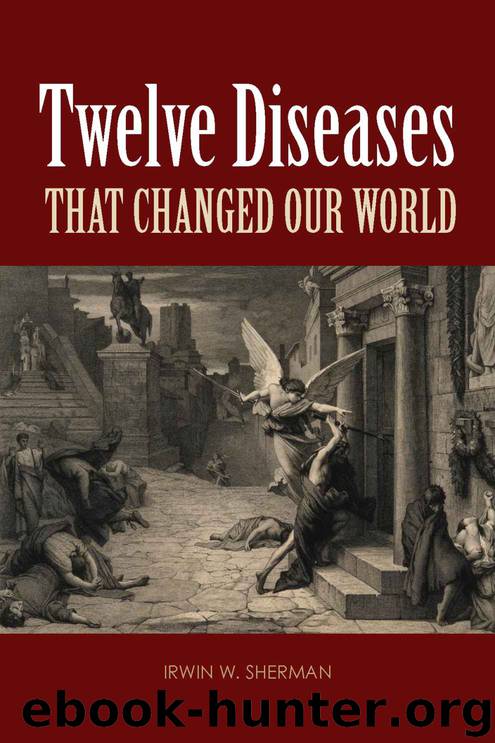Twelve Diseases That Changed Our World by Sherman Irwin W

Author:Sherman, Irwin W. [Sherman, Irwin W.]
Language: eng
Format: epub
Publisher: ASM Press
Published: 2013-03-31T00:00:00+00:00
Discovery
In 1865 a French military physician, Jean-Antoine Villemin (1827 to 1892), succeeded in transmitting tuberculosis to rabbits. Villemin recovered pus from the lung cavity of a tuberculous patient who had died 33 h earlier and injected it under the skin of two healthy rabbits. Two other rabbits served as controls and were injected with tissue fluid from a burn blister. Some months later, when the rabbits were examined, TB was found in the lungs and the lymph nodes of only those that had received the pus. Although it would seem that Villemin's demonstration of transmission would be proof enough of the contagious nature of TB, his announcement before the prestigious French Academy of Medicine was greeted with derision. His severest critic was Hermann Pidoux, who said that consumption in the poor was due to conditions of poverty including overwork, malnutrition, unsanitary housing, and other deprivations; when consumption developed among the rich, Pidoux claimed it was brought about by their overindulgence in their wealth, laziness, flabbiness, overeating, excessive ambition, and habits of luxury. In both cases the result was, in Pidoux's words, “organic depletion.” Such blind rejection of the infectious nature of TB remained until 24 March 1882, when the German physician Robert Koch made a presentation before a skeptical audience of Germany's most prestigious scientific group, the Berlin Physiological Society, in which he claimed to have discovered the microbe of tuberculosis. Koch's announcement not only resolved the contagion argument but also resulted in a shift of scientific preeminence from France (and Louis Pasteur) to Germany. This shift took place for several reasons, including differences in the style of science. French scientists relied on intellectual deduction and tended to proclaim general laws from a limited set of experiments, whereas German scientists were more methodical, their approach was more reality-based, and they relied on repetitive experiments. In addition, after the defeat of the French in the Franco-Prussian War (1870 to 1871), the German economy and its science flourished while post-Napoleonic France declined both in its wealth and in its scientific glory.
Robert Koch, born in Clausthal in the Harz Mountains of Germany in 1843, received his medical education at the University of Göttingen and then trained with the eminent pathologist Rudolph Virchow in Berlin. After the Franco-Prussian War he settled in the small farming town of Wollstein, where he had a medical practice and was the Sanitary Officer. The disease anthrax was a problem among the sheep (and sometimes humans) in and around Wollstein, so Koch, equipped with a new microscope his wife had given him for his birthday, began to examine the carcasses of sheep. Soon (in 1881) he was able to isolate and characterize the germ of anthrax, a rod-shaped bacterium. Koch presented his findings at the International Medical Congress in London in 1881. After returning from the meeting in London, he was determined to find the microbe that caused TB. Within a year he had succeeded. He wrote, “The aim of the study had to be directed first towards the
Download
This site does not store any files on its server. We only index and link to content provided by other sites. Please contact the content providers to delete copyright contents if any and email us, we'll remove relevant links or contents immediately.
Periodization Training for Sports by Tudor Bompa(8276)
Why We Sleep: Unlocking the Power of Sleep and Dreams by Matthew Walker(6727)
Paper Towns by Green John(5194)
The Immortal Life of Henrietta Lacks by Rebecca Skloot(4591)
The Sports Rules Book by Human Kinetics(4393)
Dynamic Alignment Through Imagery by Eric Franklin(4217)
ACSM's Complete Guide to Fitness & Health by ACSM(4060)
Kaplan MCAT Organic Chemistry Review: Created for MCAT 2015 (Kaplan Test Prep) by Kaplan(4014)
Introduction to Kinesiology by Shirl J. Hoffman(3776)
Livewired by David Eagleman(3775)
The Death of the Heart by Elizabeth Bowen(3625)
The River of Consciousness by Oliver Sacks(3606)
Alchemy and Alchemists by C. J. S. Thompson(3524)
Bad Pharma by Ben Goldacre(3428)
Descartes' Error by Antonio Damasio(3280)
The Emperor of All Maladies: A Biography of Cancer by Siddhartha Mukherjee(3164)
The Gene: An Intimate History by Siddhartha Mukherjee(3099)
The Fate of Rome: Climate, Disease, and the End of an Empire (The Princeton History of the Ancient World) by Kyle Harper(3067)
Kaplan MCAT Behavioral Sciences Review: Created for MCAT 2015 (Kaplan Test Prep) by Kaplan(2987)
